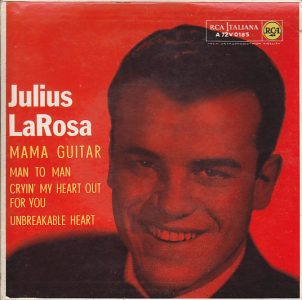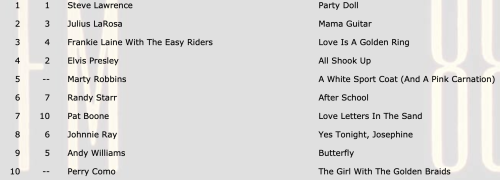#26: Mama Guitar by Julius La Rosa
City: Hull, QC
Radio Station: CKCH
Peak Month: June 1957
Peak Position in Hull ~ #2
Peak position in Vancouver ~ did not chart
Peak Position on Billboard Hot 100 ~ #98
YouTube: “Mama Guitar”
Lyrics: “Mama Guitar”
Julius La Rosa was born in Brooklyn in 1930 and raised in an Italian-American Roman Catholic milieu. Out of high school he joined the U.S. Navy and became a radioman. According to a 1991 New York Times article, La Rosa sang in the Navy Choir, at officers clubs and bars to pay for drinks. La Rosa was in the Navy when Arthur Godfrey heard him sing. Godfrey had been encouraged to listen to La Rosa by a buddy of La Rosa’s named George “Bud” Andrews, who happened to be the seaman mechanic on Godfrey’s personal airplane. Godfrey soon invited Julius La Rosa to appear on his CBS TV show. After his discharge, Julius La Rosa became a star on the Arthur Godfrey and his Friends from 1951 to 1953, recording several hits including “Eh, Cumpari”, which shot to #2 on the Billboard pop charts.
Julius La Rosa was a handsome 23 year old, and made several guest appearances on The Honeymooners. Arthur Godfrey liked to exert control over his entertainers, making demands and restricting their outside work in return for exposure on his popular show. Without Godfrey’s approval, Julius La Rosa recorded for Cadence Records — formed by Godfrey’s orchestra leader, Archie Bleyer — and had hit singles including “Anywhere I Wander” (U.S #4) and “My Lady Loves To Dance” (U.S. #21)
His growing popularity bothered Godfrey. La Rosa was getting over 7,000 letters of fan mail a week. On Oct. 19, 1953, La Rosa was due to begin the TV portion of Godfrey’s show but was kept waiting backstage until the final minutes of the radio-only part of the program. As he finished singing “Manhattan”, Mr. La Rosa and the audience heard Godfrey precede his sign-off by saying, “That was Julie’s swan song with us.”
Godfrey said he fired him because he lacked “humility” and because he had hired an agent. “I was 23 years old then and filled with myself,” La Rosa said in a 1991 interview with the New York Times reporter Elsa Brenner. “Who isn’t at 23, especially if you’re a celebrity?” The public firing boosted La Rosa’s career for a while. He served as the summer replacement on Perry Como’s TV show in 1955. That’s when he met Como’s secretary, Rosemary Meyer, and married her. He went on to get his own TV show in 1955. He also appeared on numerous other variety shows in the 1950s and ’60s, including Ed Sullivan’s.
Between 1953 and 1958 Julius La Rosa had 13 singles on the Billboard pop charts, including ten in the Top 30. In 1955 he peaked at #13 with “Domani (Tomorrow)“. With the emergence of rock ‘n roll, La Rosa was part of a group of recording artists who were falling out of favor. Teenagers were driving record sales and were buying Elvis Presley, Bill Haley & His Comets, Ricky Nelson, Fats Domino, Chuck Berry, Frankie Lymon & The Teenagers and The Platters. There was also Pat Boone, Gogi Grant, Patti Page, Doris Day Les Baxter and Nelson Riddle among the best of the year’s chart successes. But a new wind was blowing, and with it singers like Julius La Rosa were facing strong headwinds.
He did peak at #8 in November 1955 with “Suddenly There’s A Valley” on the Cashbox Magazine charts. In February 1956 La Rosa managed to climb to #15 on the Billboard pop charts with “Lipstick And Candy And Rubber Sole Shoes”. Before his final and only other Top 30 tune, “Tolero” which peaked at #21 in early 1958 on the Billboard pop charts, Julius La Rosa would release ten singles. Of these almost none of them made it onto the Billboard charts. Although his cover of Eddie Cooley & The Dimples R&B hit, “Priscilla” took La Rosa to #31 on the Cashbox charts. Despite La Rosa’s rockin’ treatment of “Priscilla”, his record sales were on a downward spiral.
Julius La Rosa released “Crying My Heart Out For You” written by traditional pop lyric songwriters Guy Wood and Sammy Gallop. The song reached #13 in Vancouver in June 1957. The same month, another track from an EP, “Mama Guitar”, also charted in some radio markets.

“Mama Guitar” was written by Tom Glazer. Born in 1914 in Philadelphia, Thomas Zachariah Glazer was a child or Russian Jewish émigré parents from Minsk (the current capital of Belarus). When he was four years old, his father died of the Spanish Flu. At 17, Glazer hitchhiked to New York, where he took night courses to complete his education while working at Macy’s during the day. Glazer began performing as an amateur and was invited by Eleanor Roosevelt to perform at the White House for soldiers working there as guards. He made a successful professional début at The Town Hall, New York City, in January 1943 during a blizzard. By 1945, Glazer had a radio show called Tom Glazer’s Ballad Box. His songs of the period, such as “A Dollar Ain’t a Dollar Anymore”, “Our Fight is Yours”, “When the Country is Broke”, and “Talking Inflation Blues” took strong social stands. Glazer’s songs were recorded by Bob Dylan, Pete Seeger, Burl Ives, The Kingston Trio, Perry Como, Frank Sinatra, and Peter, Paul and Mary. Glazer was part of the folk music scene in New York in the 1940s. Along with Lead Belly, Woody Guthrie, Pete Seeger and Josh White, Tom Glazer helped prepare for the commercially successful folk revival of the 1960s. In the 1960s he hosted a weekly children’s show on WQXR radio in New York.
In 1957, Glazer wrote the musical score for the film about a drifter and convict who becomes a politician in A Face in the Crowd. Glazer’s most famous song is a spoof of “On Top Of Old Smokey” titled “On Top Of Spaghetti”.
On top of spaghetti, all covered with cheese.
I lost my poor meatball, when somebody sneezed….
But he also penned “More” for Perry Como – a #4 hit on the Billboard pop charts in 1956. Glazer’s “Old Soldiers Never Die” was a #7 hit for Vaughn Monroe in 1951. And in 1954-55, his “Melody Of Love” was a hit for both the Four Aces and Billy Vaughn. Earlier in 1954, Glazer cowrote “Til We Two Are One”, a Top Ten hit for Georgie Shaw. In 1957, Tommy Leonetti recorded “Tears For Souvenirs”. Another hit song Glazer penned was “A Worried Man”, a Top 20 hit for the Kingston Trio in 1959. In 1954, Glazer adapted a Zimbabwean song titled “Skokiaan” and added English lyrics. His version was recorded by the Four Lads who took the tune to #7 on the Billboard pop charts. Tom Glazer died in 2003 at the age of 88.
The lyrics to “Mama Guitar” try to showcase the benefits of a man preferring the company of a guitar to the company of a woman. But the advantages listed haven’t worn well with time:
From verse 1:
You can strum her, you can thump her,
You can throw her on the floor.
You can kick her, you can dump her,
But she’ll only love ya more.
From verse 2:
You can walk away and leave her,
And she won’t sneak out and cheat.
You can take her on your travels,
‘Cause she never has to eat.
Yes, according to the song, you can do all these things to your guitar without any problems. Did Tom Glazer mean for hearers to understand you can do all these things to a guitar, and that it’s not a good idea to do these things to a woman? Even so, illustrating that you can’t thump, kick or dump a woman, or throw her on the floor, can make the listener feel concerned for any woman in this guys life. The upside is that the singer ‘loves’ his ‘mama guitar.’ Hopefully, his guitar playing leads to a peaceable temperament when he’s stopped playing.
“Mama Guitar” peaked at #2 in Hull (QC), and #7 in Charleston (SC).
In 1958, Julius La Rosa starred in the teen rock ‘n roll movie, Let’s Rock. The plot reflected real life as crooner, Julius LaRosa, attempts to fight off the burgeoning rock and roll trend. Phyllis Newman starred opposite La Rosa as his songwriting girlfriend who convinces him to adapt rather than fight. The film, aimed at the teenage drive-in crowd, also featured performances by Paul Anka, Wink Martindale, Roy Hamilton, Della Reese, Danny & the Juniors and the Royal Teens. After his final Top 30 hit in 1958, “Tolero”, Julius La Rosa continued to release nearly twenty more singles into the early 1970s (of which none made the pop charts), and six more albums.
From the mid-50s into the 60s Julius La Rosa guest starred on What’s My Line?, The Pat Boone Chevy Showroom, The Polly Bergen Show and The Merv Griffin Show.
In 1980 Julius La Rosa appeared in some episodes of the TV sitcom Laverne and Shirley. Through the 1980s, La Rosa starred as the character, Reynaldo, in the NBC’s soap opera Another World. For his acting in the soap opera, La Rosa was nominated for a Best Supporting Actor in the Daytime Emmy Award. For over a decade he was a DJ on WNEW in New York, and then for two years in 1998-99 at WNSW in Newark, New Jersey.
“I’ve had my ups and downs, my disappointments,” La Rosa told the New York Times in 1991. “That’s typical for show business. But for a kid from Brooklyn I think I’ve done okay.” La Rosa was a frequent guest in the Jerry Lewis Labor Day telethons for the Muscular Dystrophy Association. Julius La Rosa died in 2016 at the age of 86.
September 27, 2024
Ray McGinnis
References:
“Julius La Rosa, Hitmaking Crooner Fired on Air by Arthur Godfrey, Dies at 86,” Washington Post, May 15, 2016.
Paul Sciria, “Eh, Cumpari, It’s Julius La Rosa,” La Gazzetta Italiana, January 2016.
Phil Potempa, “Julius La Rosa Made TV History Because of Arthur Godfrey,” The Times of Northwest Indiana, Munster, IN, November 22, 2006.
Harry Foster, director, Let’s Rock, Columbia Pictures, 1958.
Julius La Rosa, “Lipstick, And Candy, And Rubber Sole Shoes” RCA Victor, 1956.
Paul Wadey, “Tom Glazer: Folk singer ambivalent about the success of his ‘On Top of Spaghetti’,” Independent, February 27, 2003.

CKCH 970-AM Hull (QC) Top Ten | June 8, 1957

Leave a Reply